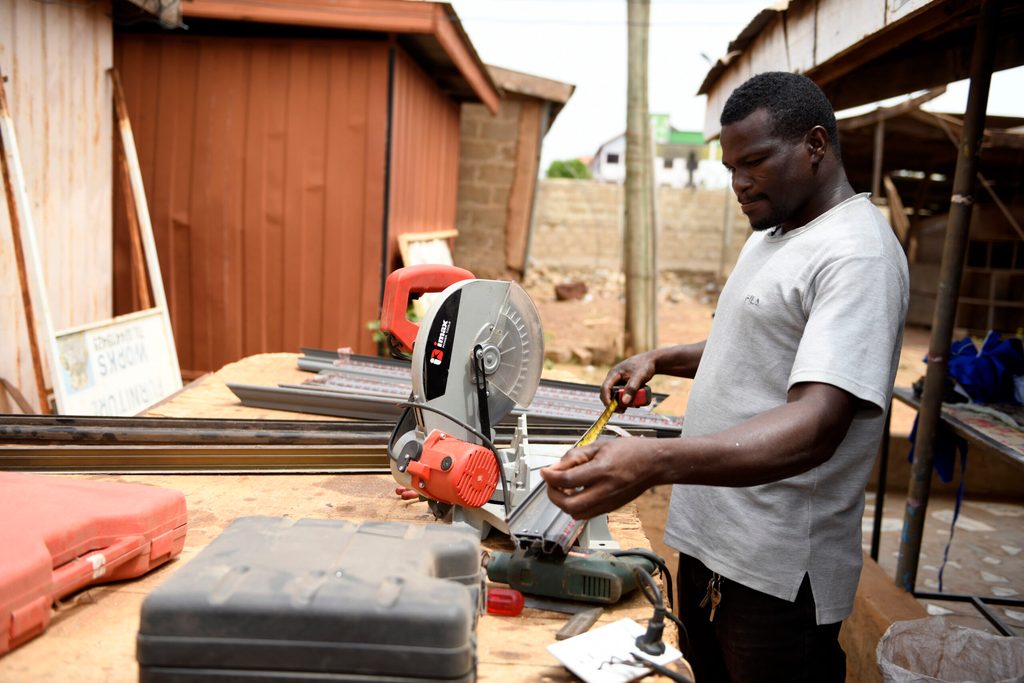Soloman was once a small informal steel bender. Now he is a registered trader, who collaborates with other businesses, trains apprentices, provides his staff with a pension scheme and uses his business management skills to competitively bid for larger contracts.

Together with his wife, 41-year-old Solomon has 6 children who are all at various stages of their education. Solomon is the sole breadwinner for his family. Just like many steel bending businesses in Ghana, Solomon’s company was classified under the informal sector with little support from Government.
In 2021, Solomon enrolled in a business operation programme whose core objective was to help formalise informal businesses such as Solomon’s company in the Tamale Metropolitan District.
During this training programme, Solomon gained an appreciation for building relationships with other businesses and professionals in the district to exchange ideas, knowledge, and best practices. The project also provided training on time-management, bidding, lobbying, and leadership skills.
Becomming a formal business
A year later and Solomon has been making big changes to the way he does business. He started by registering his business with the Ghana Revenue Authority (GRA) and also with the Social Security and National Insurance Trust (SSNIT) – a statutory public trust charged under the Pensions Act to cater for pension schemes.
“Previously, all the money I earnt from my work went towards looking after my family and other frivolous lifestyle choices with little or no savings for the future, but during the training, the programme officers helped me understand why I should pay taxes to the GRA on my monthly earnings and save for my old age when I can no longer work. I thought SSNIT contributions were only for formal government workers and not for artisans like us.”
Bidding for government and private sector contracts
Solomon has also scaled up his business.
“Because of the bidding, lobbying, bookkeeping, and other skills I learnt from the training, my confidence level in competitive bidding for jobs has shot up. I can now lobby for government and other private sector jobs which previously wasn’t the story.”
“Lobbying for government and private sector jobs requires a lot of documentary evidence, which I previously didn’t have but through this project and with my business registration, all my documents are intact and up to date to prove my credibility. The finishing of my goods has also improved because I am now aware that my products are going into public offices which can be seen by many. I now receive calls from individuals who saw my work in one office or place and want the same.”
“I feel very good when I see my quality products in places I previously only dreamed of.”
Solomon
Keeping track of earnings
Solomon has become a diligent tracker of his earnings, putting his bookkeeping skills to good use to improve his income.
“I no longer spend money anyhow, I now have a bank account for my business and have learned how to save because with the kind of clients I have now and the deadlines they give, I am forced to pre-finance many of the jobs before payment.”
A pension scheme for his apprentices
Solomon is now contributing to a pension scheme for his apprentices who are currently working with him.
“All my current apprentices have been registered under the scheme, an act which is very uncommon for artisans in this profession. I am glad I can now contribute something to the future of these men and women.
Solomon has trained over 100 young apprentices.
How Plan International helps
Solomon participated in Plan International’s business operation programme PASEWAY, in collaboration with our local implementing partner – RAINS, with funding from the German Federal Ministry for Economic Corporation and Development (BMZ). One of the core objectives for this project is formalising informal businesses.
“This training has really supported my long-term goals for my business. As well as increasing my earnings and skills, I feel very good when I see my quality products in places I previously only dreamed of,” shared Solomon.


